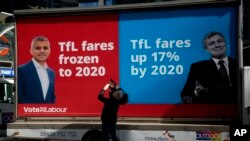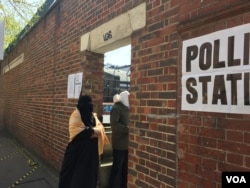The election of Sadiq Khan as London's first Muslim mayor is a sign of changing times for Britain and its population of nearly 3 million Muslims.
"He is a Muslim. We are Muslims. This is a great opportunity for the Muslim people," said Mohammed, a 69-year-old businessman in East London's largely Muslim Whitechapel neighborhood.
Mohammed immigrated to Britain from Pakistan more than five decades ago at a time when there was little accommodation for Muslims.
"When we came, there wasn't any halal food at all,” he said. “But these days, you just name it — you can get every halal product selling in the United Kingdom."
Across London, there are halal butcher shops and many products on mainstream British supermarket shelves, from potato chips to cookies, labeled as halal.
‘Open city’
Khan's victory represents a departure from the past in many ways.
In the previous six decades, London has grown from a homogeneous city to a booming, vibrant, cosmopolitan and multicultural capital that draws people from all over the world.
Tony Travers, a political analyst at the London School of Economics, told VOA that Khan's rise to be chief of this seat of the former empire "will undoubtedly be taken as evidence that London and Britain are broadly comfortable with substantial immigrant and minority populations."
"London, in particular, is likely to be viewed as a cosmopolitan and open city," Travers said.
But final results of elections across Britain show a wider polarization among the larger British population, especially on the issues of immigration and the demographic change that Khan's rise to high office represents.
Few victories
Khan’s election was one of the few victories for Britain’s Labour Party, which on Thursday suffered what analysts say was its worst defeat in more than a century.
Voters in localities across England, Scotland, Wales and Northern Ireland dealt the Labour Party a blow, exposing the stark differences between London's progressive, multicultural population and voters elsewhere who see their nation in decline and losing control of its borders.
The latter sentiments have fueled the Brexit movement for Britain to leave the European Union. It is an issue that British voters will decide in a June 23 referendum, and political analysts say Thursday's races show how close a decision it will be.
Travers calls Khan's election "a remarkable day for British Muslims," and says it suggests "British voters are happy to see Khan as a mainstream Labour politician, which he is."
‘High levels of integration’
In the span of one generation, Khan, 45, symbolizes how Muslims in Britain have gone from outsiders who were allowed in to fill labor needs during Britain's postwar reconstruction to members of the ruling elite.
“I want every single Londoner to get the opportunities that our city gave to me and my family, the opportunities not just to survive, but to thrive, the opportunities to build a better future for you and your family,” Khan said in a speech after election officials confirmed his victory.
Like the voter Mohammed, Khan's parents immigrated from Pakistan nearly five decades ago and arrived to a world of disenfranchisement and financial struggles, but also of hope and opportunity.
Khan's father worked as a bus driver and his mother as a seamstress, and the family lived in public housing. Khan went on to become a human rights lawyer, a city council member, and then a government minister.
"It's nice to see change," Mohammed told VOA. "Mr. Kahn, I think, can do a lot for the community."
Party loyalty
Some voters who did not vote for Khan told VOA they did so out of loyalty to the Conservatives, not ethnic or religious considerations.
Polls said the top issues in the mayor's race were the rising cost of housing and transportation. Khan's promises to freeze public transportation fares resonated with many.
The race was marked by bitter allegations.
Khan's main opponent, Conservative Zac Goldsmith, accused him of having links to an extremist cleric, London imam Sulaiman Ghani, with whom Khan has appeared in photos. Khan denied the allegations.
Khan's election also showed that many London voters looked beyond fears triggered by terrorist threats, the recent attacks in Paris and Brussels, and memories of the 2005 suicide attacks by four extremists that killed 52 people in London.
Era of empowerment
For British Muslims, Khan's election is the beginning of an era of empowerment in a city where each day they are seen less as foreigners, a notion acknowledged by politicians both on the left and the right.
Steve Baker, a Conservative member of Parliament, believes Britain is doing a better job of integrating its Muslim minority than previously.
"I'm very confident that we're having high levels of integration, which are getting better as the generations pass," he told VOA. Khan's success in the mayoral race, he said, "is in fact an indication of the high levels of integration we have in the U.K."






